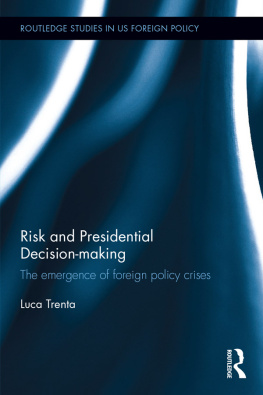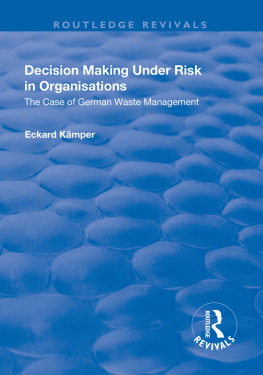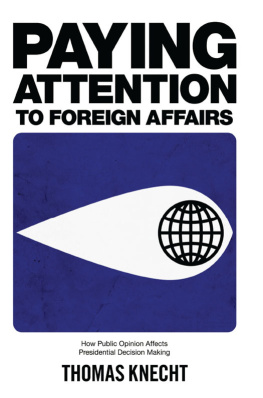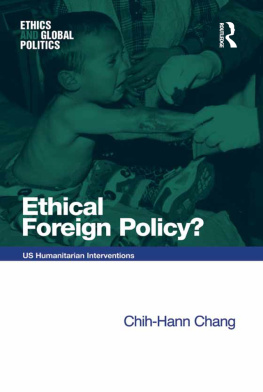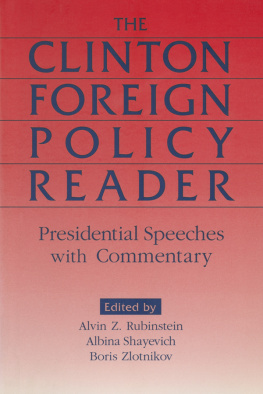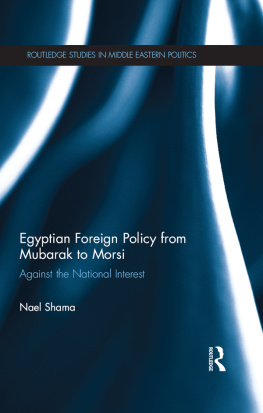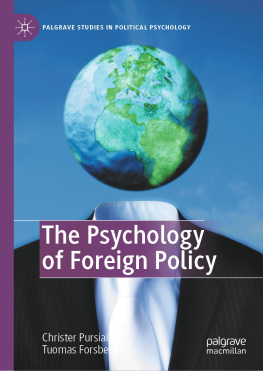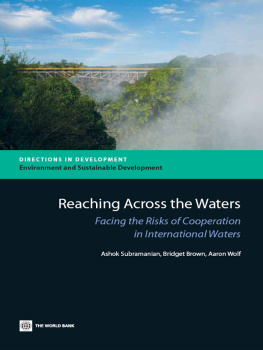Do U.S. Presidents assess risk differently today than they did during the Cold War? Luca Trenta has written an engaging book exploring how American Presidents use the concepts of risk and risk management in their decision-making. He deftly compares crises during and after the Cold War to convincingly demonstrate a significant consistency between how U.S. leaders craft policy in the two eras. Using insights from broader international relations theoryespecially sociological theories, Trenta reframes the traditional literature on foreign policy analysis to give us a broader understanding of how leaders cope with risk. A conceptually impressive account, this book will interest scholars of international politics, but also students of decision-making under uncertainty.
Jasen J. Castillo, Associate Professor, Bush School of Government and Public Service, Texas A&M University
For those interested in studying US foreign policy through the lens of risk, this is an indispensable book. Trentas command of both the conceptual literature and his case studies is formidable.
Adam Quinn, University of Birmingham, UK
This path breaking study identifies the President as the ultimate manager always having to balance between the demands of the American people and the requirements of remaining a great power. The author makes more than a significant contribution to the field: he breaks new ground. An excellent volume.
Michael Cox, Director, IDEAS, LSE, UK
Risk and Presidential Decision-making
This book aims at gauging whether the nature of US foreign policy decision-making has changed after the Cold War as radically as a large body of literature seems to suggest, and develops a new framework to interpret presidential decision-making in foreign policy. It locates the study of risk in US foreign policy in a wider intellectual landscape that draws on contemporary debates in historiography, International Relations and Presidential Studies.
Based on developments in the health and environment literature, the book identifies the president as the ultimate risk manager, demonstrating how a president is called to perform a delicate balancing act between risks on the domestic/ political side and risks on the strategic/international side. Every decision represents a risk vs. risk trade-off, in which the management of one target risk leads to the development countervailing risks. The book applies this framework to the study three major crises in US foreign policy: the Cuban Missile Crisis, the seizure of the US Embassy in Tehran in 1979, and the massacre at Srebrenica in 1995. Each case-study results from substantial archival research and over twenty interviews with policymakers and academics, including former president Jimmy Carter and former senator Bob Dole.
This book is ideal for postgraduate researchers and academics in US foreign policy, foreign policy decision-making and the US presidency. It will also be of use for departments and institutes dealing with the study of risk in the social sciences.
Luca Trenta holds a PhD from the School of Government and International Affairs, Durham University. He is a Lecturer in International Relations in the Department of Political and Cultural Studies, Swansea University.
Routledge Studies in US Foreign Policy
Edited by Inderjeet Parmar, City University, and John Dumbrell, University of Durham
This new series sets out to publish high-quality works by leading and emerging scholars critically engaging with United States foreign policy. The series welcomes a variety of approaches to the subject and draws on scholarship from International Relations, security studies, international political economy, foreign policy analysis and contemporary international history.
Subjects covered include the role of administrations and institutions, the media, think tanks, ideologues and intellectuals, elites, transnational corporations, public opinion, and pressure groups in shaping foreign policy, US relations with individual nations, with global regions and global institutions and Americas evolving strategic and military policies.
The series aims to provide a range of books from individual research monographs and edited collections to textbooks and supplemental reading for scholars, researchers, policy analysts, and students.
US Democracy Promotion in the Middle East
The pursuit of hegemony
Dionysis Markakis
Risk and Presidential Decision-making
The emergence of foreign policy crises
Luca Trenta
Anti-Americanism and the Limits of Public Diplomacy
Winning hearts and minds?
Stephen Brooks
American Grand Strategy and Corporate Elite Networks
The open door since the end of the Cold War
Bastiaan Van Apeldoorn and Nan de Graaff
US Presidential Doctrines
An American outlook
Joseph M. Siracusa and Aiden Warren
Risk and Presidential Decision-making
The emergence of foreign policy crises
Luca Trenta

First published 2016
by Routledge
2 Park Square, Milton Park, Abingdon, Oxon OX14 4RN
and by Routledge
711 Third Avenue, New York, NY 10017
Routledge is an imprint of the Taylor & Francis Group, an informa business
2016 Luca Trenta
The right of Luca Trenta to be identified as author of this work has been asserted by him in accordance with sections 77 and 78 of the Copyright, Designs and Patents Act 1988.
All rights reserved. No part of this book may be reprinted or reproduced or utilised in any form or by any electronic, mechanical, or other means, now known or hereafter invented, including photocopying and recording, or in any information storage or retrieval system, without permission in writing from the publishers.
Trademark notice: Product or corporate names may be trademarks or registered trademarks, and are used only for identification and explanation without intent to infringe.
British Library Cataloguing in Publication Data
A catalogue record for this book is available from the British Library
Library of Congress Cataloging-in-Publication Data
Trenta, Luca.
Risk and presidential decision-making : the emergence of foreign policy crises / Luca Trenta.
pages cm. (Routledge studies in US foreign policy)
ISBN 978-1-138-85424-6 (hardback) ISBN 978-1-315-72119-4 (ebook)1.United StatesForeign relationsDecision making. 2.PresidentsUnited StatesDecision making.3.United StatesForeign relations19451989.4.United StatesForeign relations19895.United StatesForeign relationsCuba.6.CubaForeign relationsUnited States.7.United StatesForeign relationsIran.8.IranForeign relationsUnited States. 9.Yugoslav War, 19911995Participation, American.I.Title.
JZ1480.T74 2016
327.73001'9dc23
2015018925
ISBN: 978-1-138-85424-6 (hbk)
ISBN: 978-1-315-72119-4 (ebk)
Typeset in Times New Roman
by Apex CoVantage, LLC
Every decision a president makes involves uncertainty.
Every decision involves risk.
Theodore C. Sorensen, 1963
Contents
Students and practitioners of international politics are at present in a strange predicament. Complex though their problems have been in the past, there was then at least some certainty about the givens, the basic structure and the basic phenomena of international relations

